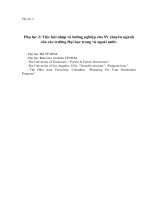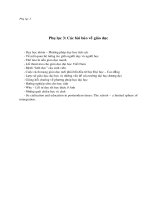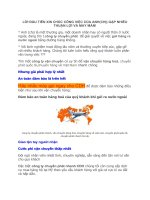Nghiên cứu nhân tố gây nên hứng thú sinh viên không chuyên việc học tiếng Anh chuyên ngành trường Cao đẳng Công nghiệp Nam Định
Bạn đang xem bản rút gọn của tài liệu. Xem và tải ngay bản đầy đủ của tài liệu tại đây (563.04 KB, 38 trang )
VIETNAM NATIONAL UNIVERSITY, HANOI
UNIVERSITY OF LANGUAGES AND INTERNATIONAL STUDIES
FACULTY OF POST-GRADUATE STUDIES
*****
M.A. MINOR PROGRAM THESIS
A STUDY ON FACTORS DEMOTIVATING NON-MAJOR STUDENTS IN
LEARNING ESP AT NAM DINH INDUSTRIAL COLLEGE
Nghiên cứu những nhân tố gây nên sự mất hứng thú
đối với sinh viên không chuyên trong việc học tiếng Anh chuyên ngành
tại trường Cao đẳng Cơng nghiệp Nam Định
Presenter:
Trần Thị Thanh Bình
Course: QH2016 - E3
OUTLINE
I. Introduction
I. Introduction
1. Rationale of the study
A limited number of studies exist on demotivation
students tend to carry in the course of learning English
for Special Purpose (ESP)
The negative impact of demotivation on ESP learning
of students at NICOL
I. Introduction
2. Aim and objectives of the study
Investigating the factors that demotivate non-major
students in learning ESP at NICOL.
Suggesting teaching strategies and techniques in
order to assist students at NICOL to overcome
demotivation in learning ESP.
I. Introduction
3. Research questions
(1) What are the factors that demotivate non-major
students in learning ESP at NICOL?
(2) What strategies and techniques can be applied to
assist
students
demotivation?
at
NICOL
to
overcome
I. Introduction
4. Scope of the study
Due to the limitation of time and scale of a minor
thesis, it is impossible to cover all aspects of
demotivation in learning ESP in this study. Thus, the
study focuses on examining the factors that
demotivate the non-major students in learning ESP
at NICOL. It involves the participants of 3 teachers of
English and 155 students in three faculties at
NICOL.
I. Introduction
5. Method of the study
The study primarily employs a survey questionnaire to
find answers for the research questions. Data is collected
through a survey questionnaire which is delivered to 155
students at NICOL. Besides, informal interviews with
teachers and students are carried out to collect more
information and to reinforce the findings found from the
survey questionnaire.
II. Review of literature
1. Motivation
Definitions
of motivation
Motivation
in learning
foreign
language
2. Demotivation
Definitions of
demotivation
Overview of previous
studies related to student
demotivating factors
Demotivating factors in
foreign language teaching
and learning
3. ESP
Definitions of ESP
Classification of
ESP
ESP teacher
The ESP learner and
Motivation
ESP course and
materials
III. Methodology
1. Research setting
2. Subjects
3. Data collect instruments
4. Data collection procedure
5. Data analysis method
III. Methodology
1. Research setting
Description of the ESP course and its objectives at
NICOL
Description of the students at NICOL
Description of English teachers at NICOL
Description of teaching facilities at NICOL
Description of testing and assessment at NICOL
III. Methodology
III. Methodology
3. Data collection instruments
Questionnaires for students
Interviews for students and teachers
III. Methodology
Questionnaires for students
This survey questionnaire consists of 41 questions,
including 40 five-point Likert type questions that was
constructed based on demotivating factors used by Sakai
and Kikuchi (2009), Trang Tran., & Balduf Jr. (2007).
III. Methodology
Questionnaires for students
Internal
factors
Students- related factors (statements 1 to 11)
* teachers' competence and teaching styles (statements 12
External
factors
to 24)
* teacher-student rapport (statements 25 to 28)
* learning contents and materials (statements 29 to 34)
* teaching and learning environment (statements 35, 38)
* test score and examination (statements 39, 40)
III. Methodology
Interviews for students and teachers
3 main questions for students (Appendix 3 & Appendix 4)
1. Have you ever been demotivated in learning ESP? If yes, when?
2. In your opinions, what makes you feel demotivated in learning ESP?
3. In your opinion, what are possible solutions to minimize demotivation in learning ESP?
4 main questions for teachers (Appendix 5)
1. In your opinion, what demotivated your students in ESP lessons?
2. How do you evaluate the course book?
3. What teaching activities and techniques did you employed in teaching ESP?
4. In your opinion, what solutions can help your students to overcome their de-motivation?
4. Data collection procedure
Phase 1
Questionnaire delivery
In January 2018
From 5 classes of 3 faculties
30 minutes of learning period
with acceptance of teacher
Phase 2
Interview with students
Two weeks after the questionnaire
delivery
Select students randomly: 10
Interview in their off-period
Interview with teachers
After questionnaire delivery
Interview where convenient for
teachers
III. Methodology
5. Data analysis method
The data collected were firstly classified into different categories, such
as students’ internal demotivation factors and external demotivation
factors in ESP class and solutions to motivate students. Based on
categories established, data were then analyzed by using descriptive
statistics (percentage).
Moreover, typical quotations from the interviews, the answers to openended questions in the questionnaires were cited when necessary.
Interpretation and conclusions were drawn after analyzing the data.
IV. Data analysis &Findings
1.
IV. Data analysis &Findings
1. Data analysis and discussion of
students’ survey questionnaire and
interview
Table 2: Student- related
demotivating factors
IV. Data analysis &Findings
1. Data analysis and discussion of students’ survey questionnaire and interview
Table 3:
Teachers' competence
and teaching styles
related to
demotivating factors
teachers’ fast speed of speaking
(60.65%)
too much homework and very little
in-class work ranks (57.76 %)
teachers’ inadequate specialized
knowledge (56.78%)
IV. Data analysis &Findings
No.
25
26
27
28
Items
Teacher is lack of care and
enthusiasm.
Teacher
demonstrates
favoritism (appreciate high
achievers, humiliate on
low achievers).
There is lack of interaction
between teachers and
students.
Teacher is strict and
inflexible.
1
24.52
%
2
29.68
%
21.29
%
35.48
%
27.10
%
18.06
%
3
4
18.71
%
5
19.35
%
12.91
%
14.19
%
16.13
%
29.68
%
6.45%
18.71
%
18.06
%
21.94
%
9.03%
23.23
%
27.74
%
7.74%
Table 4: Demotivating factors related to
teacher-student rapport
A strong
demotivator in
this category is
strict and
inflexible teachers
(50.97%).
IV. Data analysis &Findings
1. Data analysis and discussion of students’ survey questionnaire and interview
too many new words in the lessons
(67.74%
Table 5: Demotivating
factors related to
learning contents and
materials
the content of specialized reading texts in
the course book was difficult to
understand (63.22%)
tasks in the course book are boring and
difficult (56.13%)
In the interview, some of the students admitted that “It takes time to find out the
meanings of words. I tried to look it up, but I was disappointed because the
explanation in the dictionary seemed not related to the ESP lesson”.
IV. Data analysis &Findings
No.
35
36
37
38
Items
1
Teaching and learning
facilities are insufficient
19.35
(library, teaching aids:
%
handouts,
pictures,
computers …)
The atmosphere in ESP
classes is boring and
stressful.
My partners are not
interested in learning ESP.
I have no chance to use
English outside class.
2
3
4
5
12.90
%
9.68%
25.81
%
32.26
%
24.52
%
23.87
%
5.15%
25.81
%
20.65
%
25.81
%
29.03
%
6.45%
20.65
%
18.06
%
18.06
%
15.48
%
3.23%
29.68
%
33.55
%
Table 6: Demotivating factors related to teaching and
learning environment
The second
demotivating
factor (58.07%).
The first
demotivating
factor (63.23%).
IV. Data analysis &Findings
2. Data analysis and discussion of teachers’ interview
Students’ attitudes toward ESP from the teachers’ view
Teachers’ opinion on factors demotivating students in
learning ESP
Teachers’ opinion to the ESP course book
Teaching techniques and activities employed by teachers in
teaching ESP
Teachers’ opinions on strategies and techniques to help
students overcome their motivation









